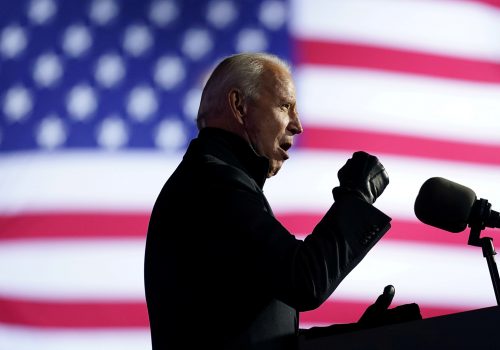FAST THINKING: How a President-elect Biden will confront climate change
Read the full reaction from our experts
JUST IN
In their victory speeches this weekend, Joe Biden and Kamala Harris declared that combating climate change will be one of their administration’s top priorities, alongside containing COVID-19, rebuilding the US economy, rooting out systemic racism, and bridging America’s political divides. Let’s zoom in on what’s coming next on climate.
TODAY’S EXPERT REACTION COURTESY OF
- Kathy Baughman McLeod: Climate-change expert and director of the Atlantic Council’s Adrienne Arsht–Rockefeller Foundation Resilience Center
- Randy Bell: Energy expert and director of the Atlantic Council’s Global Energy Center
- Josh Lipsky: Former IMF and US State Department official, and director of the Atlantic Council’s GeoEconomics Center
Expect unprecedented (and swift) executive action
Kathy has the scoop on what it will actually look like for a Biden administration to make climate change a national priority:
- “President-elect Biden plans to advance legislation during his first year in office that establishes an enforcement mechanism that includes milestone greenhouse-gas emissions reduction targets by his first term’s end in 2025; makes a historic investment of $2 trillion in clean-energy and climate research and innovation; and incentivizes the rapid deployment of clean-energy innovations and climate-smart infrastructure across the country.”
- “Such investments will focus especially on areas most vulnerable to climate impacts such as extreme heat, and on communities of color, including coastal communities suffering from the effects of sea-level rise, salt-water intrusion, and sunny-day flooding, as well as the storms that increasingly hammer at-risk areas, where 40 percent of Americans live and work.”
Subscribe to Fast Thinking email alerts
Sign up to receive rapid insight in your inbox from Atlantic Council experts on global events as they unfold.

When climate and politics collide
- But while Biden’s “climate and energy plan is the most ambitious ever of any major-party presidential nominee,” Randy stresses, he won’t be carrying it out in a political vacuum. Quite the opposite: “With the Senate likely to remain in Republican control, these ambitions will probably be curtailed. The administration’s power will be limited to executive order and agency rulemaking, with a few exceptions where there is bipartisan Congressional support such as for basic research, nuclear energy, carbon capture, and nature-based solutions.”
- Here’s the essence of the president-elect’s predicament, he adds: “Biden’s challenge in the short term will be to rejoin the Paris agreement and undo much of the Trump administration’s deregulatory agenda without significant support from the Hill, while remaining under pressure from the left to do more.” Recognizing “that a rush to ban fossil-fuel production is bad politics, undermines US foreign-policy goals, and ultimately has minimal impact on the climate,” Biden “is likely to focus his efforts on reducing demand for fossil fuels while also making them cleaner by limiting methane emissions and encouraging carbon capture and sequestration.”
- Randy also sets Biden’s agenda in an international context: “Getting the United States on a path to net-zero emissions by 2050 is hugely ambitious and puts the United States in the same club with the Europeans, Japanese, South Koreans, and Chinese (though the Chinese are aiming for 2060).”
The economics of climate policy
- Josh points out that all of this connects with another one of the incoming administration’s top priorities: economic revitalization. And here too we can’t cut Congress out of the story: “The economic agenda for the next four years depends as much on the future make-up of the new Senate as it does on the election of the next US president.”
- “The Biden administration will still advance its priorities toward building the green economy and improving healthcare, childcare, and education, with the goal of providing universal pre-K for all families,” he notes. “To partly fund these major spending increases, the Biden administration plans to raise taxes on corporate profits and American households that make more than $400,000 per year. While all of this will be up for debate in a Republican Senate, it would be a mistake to think compromise is impossible with only one to two Republicans needed for a bill.”
Further reading
Sat, Nov 7, 2020
Joe Biden just won the presidency: What does that mean for America’s role in the world?
Elections 2020 By
Atlantic Council experts weigh in on what the outcome of the 2020 election means for US foreign policy and America’s role in the world.
Wed, Nov 4, 2020
What the US withdrawal from the Paris Agreement means for the global fight against climate change
Global Energy Forum By
The pandemic illustrated the critical role for strong national leadership in combating a crisis and what happens when countries—including the United States—fail to cooperate on a multilateral level to find a solution.
Fri, Oct 30, 2020
Either way, this election is a major turning point for our climate future
Elections 2020 By
As the nation braces for the presidential election next week, there’s arguably no issue beyond the COVID-19 crisis for which the stakes are higher than climate change policy.
Image: Crews pump out flooded streets after heavy weekend rain flooded the Sea Pines neighborhood in Lantana, Florida on October 27, 2020. Crews continue to pump millions of gallons of water out of the development. [GREG LOVETT/palmbeachpost.com]B1 Cp Wpb 102920 Climate 01


